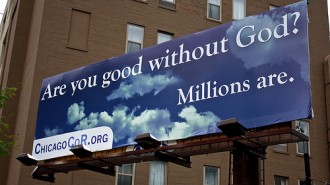 A few days ago the Vancouver Sun ran a story about new Canadian research on the topic of prejudice against atheists in North America. The article’s lead author, Will M. Gervais, told the Sun, “The only group the study’s participants distrusted as much as atheists was rapists.”
A few days ago the Vancouver Sun ran a story about new Canadian research on the topic of prejudice against atheists in North America. The article’s lead author, Will M. Gervais, told the Sun, “The only group the study’s participants distrusted as much as atheists was rapists.”
The newspaper story implies this is a new finding, but the paper, published in the Journal of Personality and Social Psychology, builds off an article I published with my colleagues Penny Edgell and Joe Gerteis a few years ago in the American Sociological Review. In that paper, part of our ongoing American Mosaic Project, we found that atheists were the least trusted on a long list of racial and religious minorities that we asked about in a representative national survey of Americans. It might not have been the first time this result was reported, but it seems to have been the first and fullest treatment of the anti-atheist phenomenon in the post 9/11 era. (It also resulted in what is perhaps the proudest citation of my scholarly career–and certainly the one my teenagers are most impressed with: p. 62 of Stephen Colbert’s I Am America (and So Can You)!. Colbert compares atheists with homosexuals, whom he says rate higher because at least we trust them with our hair. Okay, so we aren’t as funny as Colbert and weren’t mentioned by name, but the point is to get the work out there, right?)
Anyway, this new JPSP article, co-authored with Azim F. Shariff and Ara Norenzayan, not only confirms our initial findings about the level of anti-atheist sentiment, it takes the research further to explore the social psychological underpinnings of this bias. One important point they make is that anti-atheist bias is not just dislike or distaste, it is active distrust. And, using a series of survey questions designed specifically to probe these mechanisms, the authors are able to show that religious belief is one important factor that seems to be driving this phenomenon. North Americans, it would seem, believe that people behave better if those people think there is a god watching them.
None of this is to say that this is actually true, but, it does seem to be what regular folks think. My hope, as expressed in the original piece with Edgell and Gerteis, is that this work will stimulate better thinking and research not only on atheists, but on the role and significance of religious belief and practice–or lack thereof–in contemporary society.
*Photo by Eric Ingrum via flickr.com (click for original)

Comments 5
Penny Edgell — December 7, 2011
I do think there is starting to be more research focused on understanding the nature and patterns of anti-atheist sentiment. When I go to conferences now (ASA, Society for the Scientific Study of Religion) there are usually panels on this topic, showcasing research by a mix of younger and more established scholars, and often focusing on the U.K. or Canada (not just the U.S.). It's great to see more research on what I think is a small but symbolically significant group, and I hope we can move to more comparative studies that can help illuminate the influence of national context on these attitudes.
jeffdowd — December 8, 2011
Two things always fascinate me about this topic. First, as an atheist I always wonder what would happen if I announced this to my classes - would they be less likely to believe the course material. in other words, does lack of trust make any claim by an atheist whether about morality or not suspect? Or is this a vague and abstract mistrust that doesn't manifest itself in interpersonal interaction? Second, to what extent is the mistrust of atheists influenced by the christian persecution complex that is on brilliant display in Fox News "war on christmas" segments? In other words, do the religious view the non-religious as attacking them and thereby view their own intolerance as defensive?
Arturo — December 10, 2011
I think Jeff makes an interesting point about the "christian persecution complex" currently playing out on the Fox airwaves...I wonder to what extent atheists are distrusted in part because of their assumed persistence on the whole separation of church and state thing...perhaps there is some cultural resentment towards the group because they are seen as the ones who have to continually remind us of clear constitutional violations ....
I'm sure that's not the whole picture but seeing Perry's new ad playing out in Iowa this week ("Obama allows gays to serve openly in the military while school children are prevented from praying at school"), made me think that the "atheist attack on X-mas" narrative must have some traction
Atheists and Mormons and Muslims, Oh My » The Editors' Desk — December 17, 2011
[...] data). And of course, last week, I’d written about my own work and new Canadian research on Americans’ lack of trust in the Atheists among us. All of a sudden, religion was becoming a mini-theme here on The Society [...]
Kristin Richie — April 1, 2012
I'm studying psychology of personality and one study showed how religion supports prejudice, discrimination, and even at times racism.